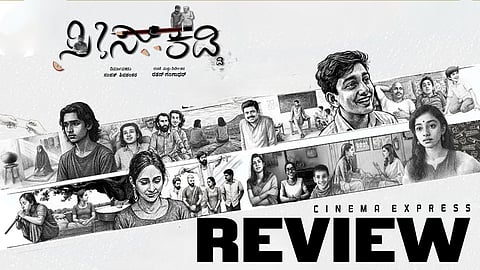Sees Kaddi Movie Review: A pencil’s stroke through scribbled lives, sharpened truths, and erased doubts
Sees Kaddi(3 / 5)
Rathan Gangadhar's Sees Kaddi is like a handwritten letter in a digital world—simple on the surface, but full of heart, questions, and quiet rebellion. At once ambitious and personal, deeply local yet strikingly universal. It feels heavy, not because of its length, but because it refuses to entertain without asking you to feel, think, and engage.
Director: Rathan Gangadhar
Cast: Cithin Appaiah, BS Ramamurthy, Manvi Belgar, Pratham Raje Urs, Anushka R, Sreshth Juptimath, Sowmya Jaganmurthy, Santhosh Karki, Sanjay Gowda and Mahendra Gowda
Sees Kaddi, which translates as Pencil in English, begins with a lighthearted disclaimer: “No animals or birds were harmed… but many pencils were sacrificed.” It sounds playful, but it’s more than a joke. That pencil becomes the film’s soul. A pencil can write, erase, break, and still be sharpened again. In Sees Kaddi, it becomes a symbol of survival, struggle, creativity—and quiet dignity. But does this deep symbolism lift the film or weigh it down?
Let’s start with what works—and works deeply. The film frames itself through Vikram (Cithin Appaiah), a troubled writer who imagines himself as King Vikrama. In his mind, he talks to a security guard who becomes a Bethaala-like figure (B.S. Ramamurthy). Their conversations are philosophical and strange—sometimes heavy—but they become the base for a larger story. The question underneath it all: Can stories help us find ourselves? Can writing name those whom history ignores?
From there, we follow four beautifully drawn stories: A nameless girl (Manvi Belgar), who wants to be a classical singer, finds her voice through a deaf and mute teacher (Sowmya Jaganmurthy). A schoolboy, Raveesh (Pratham Raje Urs), loses a calligraphy contest and feels broken—not by the result, but by crushed hope. He is gently guided by his teacher.A writer, Fareed (Sanjay Gowda), meets Manji, a young girl working two jobs to care for her bedridden father, and her quiet strength changes his path. Finally, Toufiq (Sreshth Juptimath), a young boy who works at a cinema, teaches a failed filmmaker, Vicky (Mahendra Gowda), how to see films again—with heart.
Each of these characters is writing their own story—with literal pencils, or with action, song, or memory. But can a pencil rewrite lives? The film says yes—though at times, that optimism feels a little too perfect.
Visually, the film is a treat. Suneil Narasimhamurthy’s cinematography finds beauty in simple places—sunlight on old walls, a pencil sketch in progress. Editor Anirudh Harshavardhan lets the film move slowly, giving it time to breathe. But it does test your patience. It doesn’t allow you to watch casually—it asks you to slow down and think.
KC Balasarangan’s music feels like you’re flipping through the pages of a sketchbook while listening. The songs are rooted. The lyrics—by Mahesh NC, Mahendra Gowda, Pratap Bhatt, and Anujaya S Kumtakar—feel like truths spoken straight from the soil. The sync sound and design by Satyamurthy and Hanosh Khan keep everything grounded and natural.The screenplay—by Akarsha Kamala, Akshara Bharadwaj, Sharath K. Parvathwani, Jayanth Venkat, and Mahendra Gowda—is full of ideas. But sometimes, it feels too full. Characters don’t always speak like real people. Children talk like philosophers. Adults become symbols. The episodes start to feel more like a lesson than a lived experience.Still, the pencil stays with us—especially when Raveesh holds his pen like it’s hope itself. Toufiq refuses to pay for films unless they truly move him—he watches with his heart, not just his eyes. The young singer doesn’t find her name on paper, but in her talent. The pencil might be small and easy to break—but it insists on being used. Just like them.But does every story need a moral? Must every pencil line draw a lesson?And yet—that might be Sees Kaddi’s most special quality. It’s not about big fights or loud endings. It simmers. It draws its world not in ink, but in graphite. Soft. Uncertain. Real.In the end, a radio voice—gentle, warm—closes the film like a bedtime story. That way, Sees Kaddi is an earnest effort, sometimes a bit too eager to teach. But it believes in each of its stories, in second chances, in the everyday strength of ordinary people. It believes that failure isn’t the end—it’s just a rough draft. That even a broken pencil can still write.This is a film you may question, even argue with—but one you’ll carry with you. Not because it shouts, but because it scribbles—gently, until something sticks.Ultimately, Sees Kaddi draws its truths in pencil—and waits for you to see them.

